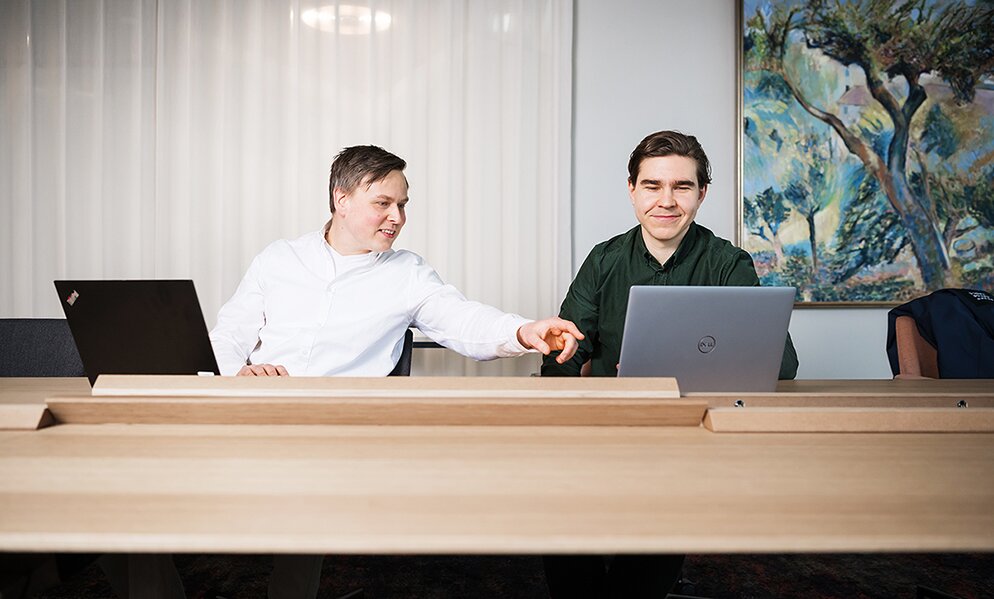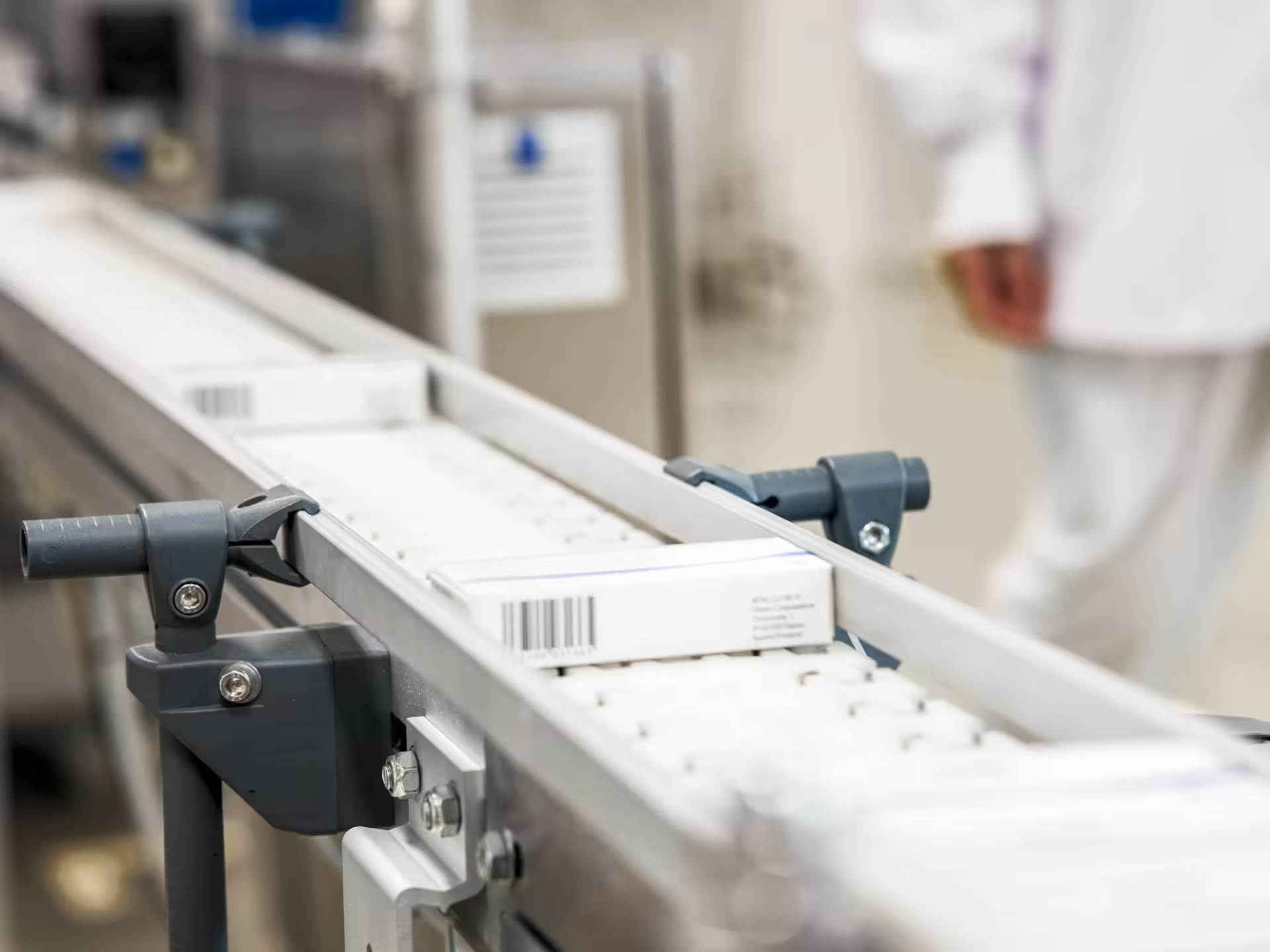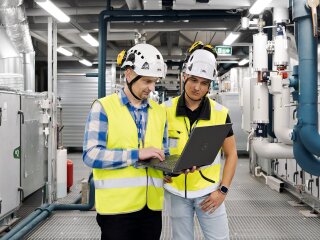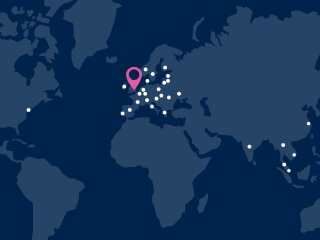“When a patient takes a medicine manufactured by Orion, they will get precisely the amount of active ingredient that is shown on the side of the pack,” says Tomi Pitkäniemi, Automation Manager, describing the importance of his team’s work.
Pitkäniemi leads the Design and Development team, which is responsible for the automation systems of Orion’s machines and equipment and ensures that they work reliably and correctly. This, in turn means that Orion’s production operators, laboratory chemists, proprietary pharmacists, pharmacists and research assistants who use the systems and the data they produce can focus on their work and rely on the operations of the validated systems.
“The well-functioning and up-to-date automation systems support the quality and competitiveness of our work and our products,” says Pitkäniemi.
Tomi Pitkäniemi: “An automation system does not come about automatically.”
The automation department employs around thirty professionals in Espoo, Kuopio, Turku and Salo. Pitkäniemi and his six-person Design and Development team are tasked with outlining and developing Orion’s ways of carrying out automation efficiently and sustainably.
“We design new automation systems, harmonise the life cycle management of existing systems and coordinate projects under our responsibility. We are involved in designing equipment tailored to Orion and supporting their operation,” says Pitkäniemi.
As designers of new systems, members of the Design and Development team are at one moment innovative, future-oriented ‘propellerheads’, and the next moment meticulous engineers with technical skills who are skilled at commissioning equipment, preventing problems, and providing day-to-day support to production in the use of equipment, machines and systems.
“Automation systems streamline and speed up the work of a pharmaceutical company, but well-functioning systems don't happen by themselves. Our team has to do a lot of work on new systems while also maintaining existing systems. My task is to ensure that the big picture remains in line with Orion’s strategy,” says Pitkäniemi.
Niklas Kuusio: “The project manager has a bird’s eye view and knows what strings need pulling.”
The automation department’s work consists of numerous projects that overlap and require expertise from several different organisations. Examples of typical projects include developments, upgrades, modernisations and equipment purchases of production information systems or manufacturing equipment. As Project Manager in the Design and Development team, Kuusio makes sure that the right things are done at the right time in projects, and that the right people in terms of decision-making are sat at the table in meetings.
“As Project Manager, I let the automation and production engineers get on with their work, but I monitor the progress of the project and anticipate the next steps. My job requires coordination skills, an understanding of Orion’s different operations, a broad network and the ability to know what strings need pulling,” Kuusio says.
Kuusio has worked at Orion for almost four years, two of which have been in the automation department in Pitkäniemi’s team.
“I started at Orion as a project engineer, where I built up my understanding of Orion and its operations. During that time, I was involved in several different projects, one of the largest of which was the implementation of a new digital manufacturing execution system. I now draw on this expertise on in my current job.” 
Focus on human management ensures feeling of safety
As a supervisor, Tomi Pitkäniemi is responsible for the well-being of his team members and helps to prioritise tasks during the working days, which can sometimes be hectic. Pitkäniemi has also been an automation engineer, and his knowledge of the subject has been very useful in his role as supervisor.
“Sometimes I work on solving automation system challenges with the support of my team. The varied nature of the work keeps you alert,” Pitkäniemi says.
The automation department prefers to keep teams small, so that supervisors can keep an eye on how their team members are doing and their well-being. Pitkäniemi feels it is important to have time for his team members.
“Straightforward feedback between the supervisor and colleagues is important in everyday life. I've always been able to talk about what's on my mind and get help when needed. That brings a feeling of safety,” says Kuusio.
The four best things about our work – Tomi Pitkäniemi and Niklas Kuusio:
- People-first philosophy: “Everyone is treated as a person and an individual rather than purely an employee.”
- Opportunities for professional development: “Daily work involves a wide range of technical tasks and challenges that help to develop professional skills. Support is also provided for training.
- Opportunities to influence matters: “Visions and views are listened to and acted upon if they are collectively identified as sensible improvements.”
- Flexibility: “Flexibility is important for well-being at work, especially in a family with children.”











